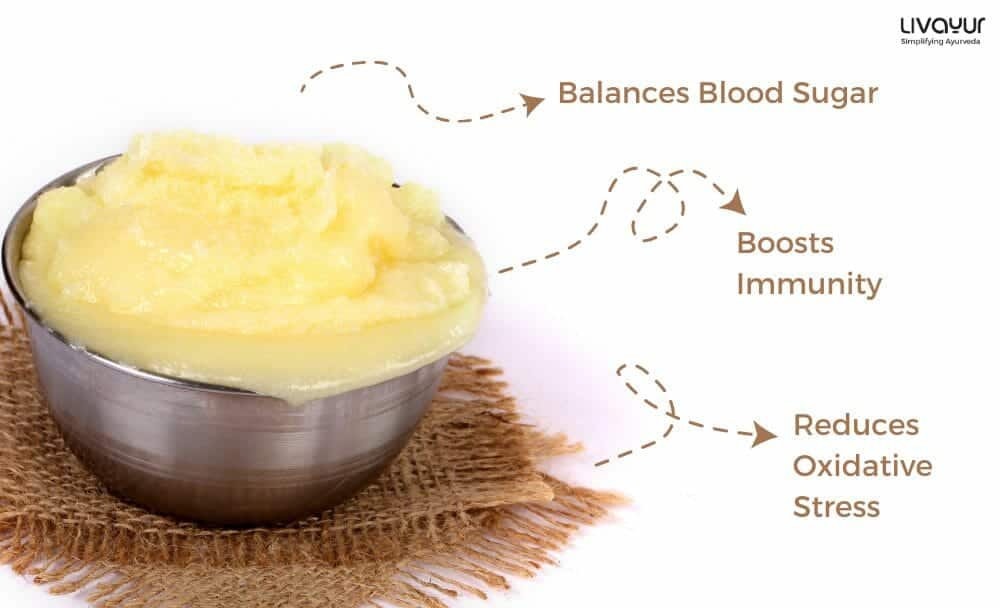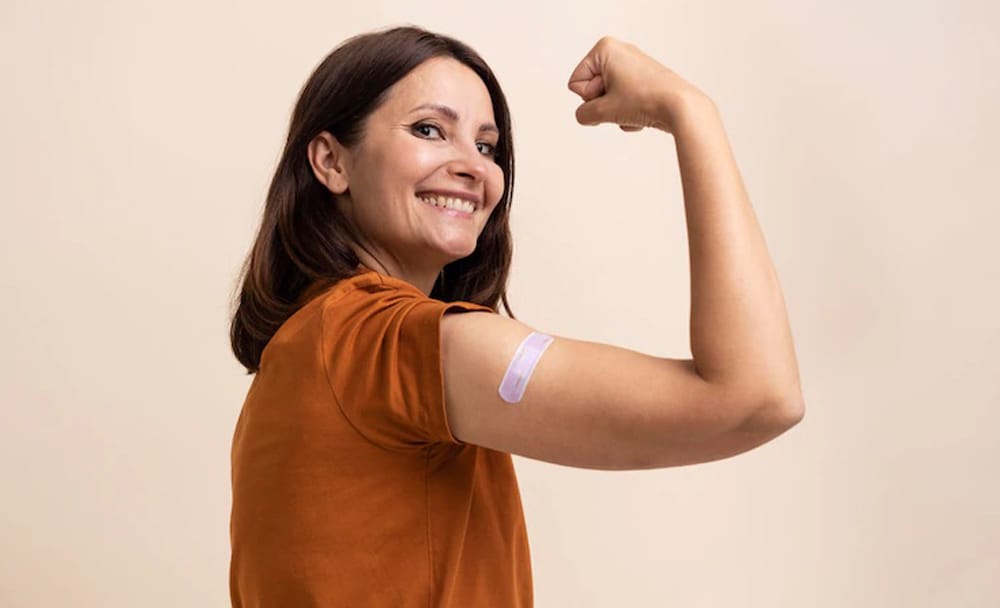
Diabetes, in Ayurveda popularly known as Madhumeha is a chronic disease that causes blood sugar levels in the body to increase. It occurs when the pancreas does not produce enough insulin to break down and metabolise glucose, leading to excessive levels of blood glucose in the body.
Diabetes is a progressive disease and can also lead to many complications in the body, such as heart diseases, kidney diseases, skin problems, eye disorders, etc. However, if managed properly, you may delay and even prevent these complications altogether.
One of the most crucial tools to manage diabetes is diet. Eating a healthy and balanced diet helps to ensure that the optimum amount of glucose is provided to the body without elevating blood sugar levels. However, in this discussion, Ghee often seems to be a topic of debate.
Is Ghee Good for Diabetes?
According to Ayurveda, Ghee is a medicine for diabetes. The fatty acids present in Ghee help metabolise and balance high blood sugar levels in the body. Therefore, diabetes patients are often recommended to add a teaspoon of Ghee to their diet.
Benefits of Ghee For Diabetics:
Helps Improve Digestion

High blood sugar levels affect the vagus nerves that stimulate the small contractions required for bowel movements. As a result, diabetes tends to slow down digestion and create toxins or Ama in the process.
Ghee helps to not only eliminate these toxins but also improve digestion and treat constipation. It is also rich in butyric acid, which helps prevent many gastrointestinal disorders, such as ulcers, colitis, etc. Additionally, Ghee also aids in keeping the digestive tract clean and improving the functioning of pancreatic glands that secrete insulin in the body.
Fights Skin Complications

One of the leading complications of diabetes is skin disorders such as rashes, itching, etc. Most skin problems are caused due to a poor digestive system and accumulation of toxins in the body. Ghee helps to detoxify the body and improve digestion, thereby preventing and treating many skin problems.
May Prevent Heart Diseases

Another common complication of diabetes is heart disease. Ghee is rich in linolenic acid, which helps to reduce the risk of cardiovascular diseases and boost heart health. It is also substantially loaded with omega-3 fatty acids that help prevent coronary heart disease and reduce insulin resistance in diabetes patients.
Reduces Oxidative Stress
Oxidative stress can cause insulin resistance, diabetic neuropathy and many other complications in diabetes patients. Ghee is highly rich in antioxidants, and therefore, helps reduce oxidative stress and fight free radical damage in the body.
Boosts Cellular Metabolism and Immunity
High blood sugar levels can reduce the body’s ability to fight diseases, such as eye disorders, skin complications, liver diseases, etc. Loaded with vitamins and minerals, Ghee is a good option to improve cellular metabolism and boost immunity.
One of the main nutrients found in Ghee is vitamin A, which is essential for your eyes, skin, hair and immune system. It is also rich in vitamin K2, which helps promote heart and bone health, and vitamin E, which helps to reduce the free radical damage in the body.
Reduces the Impact of High Glycemic Foods
Foods with a high glycemic index can cause a spike in blood sugar levels and worsen diabetes. Ghee helps reduce the glycemic index of foods and control the impact of carbohydrates on your blood sugar levels.
How to use Ghee for Diabetics?
Add a teaspoon of Ghee every day to the food. You can add it to dal, rice or any other carbohydrate to help digest it better. You may also use Ghee instead of cooking oils and butter. However, you must not consume Ghee excessively. Otherwise, it may cause weight gain and reverse the benefits. It is always recommended to consult a doctor or dietitian before using Ghee in diabetes.
Ayurveda also recommends using Ghee in Panchakarma to treat diabetes patients. Panchakarma helps restore the balance of Doshas in the body and remove harmful toxins that can adversely affect your diabetes.
Takeaway
According to Ayurveda, Ghee is one of the healthiest sources of dietary fats, and therefore, must be included in the diet. Using Ghee for diabetics can lower the risk of cardiovascular diseases, skin disorders, eye problems, etc. It also helps to boost immunity, improve cellular metabolism and reduce oxidative stress. Furthermore, Ghee aids in the digestion of high-carb foods, making it a healthy choice for diabetes patients.
However, while adding Ghee to the diet, it is pertinent to remember that excessive quantities of Ghee can be harmful to diabetes patients. You must eat Ghee in an adequate quantity. In addition, you should also make sure that Ghee is organic and of good quality. The best Ghee for diabetics is homemade desi Ghee.
Manage Diabetes With The Knowledge Of Ayurveda (Download Ebook)

















